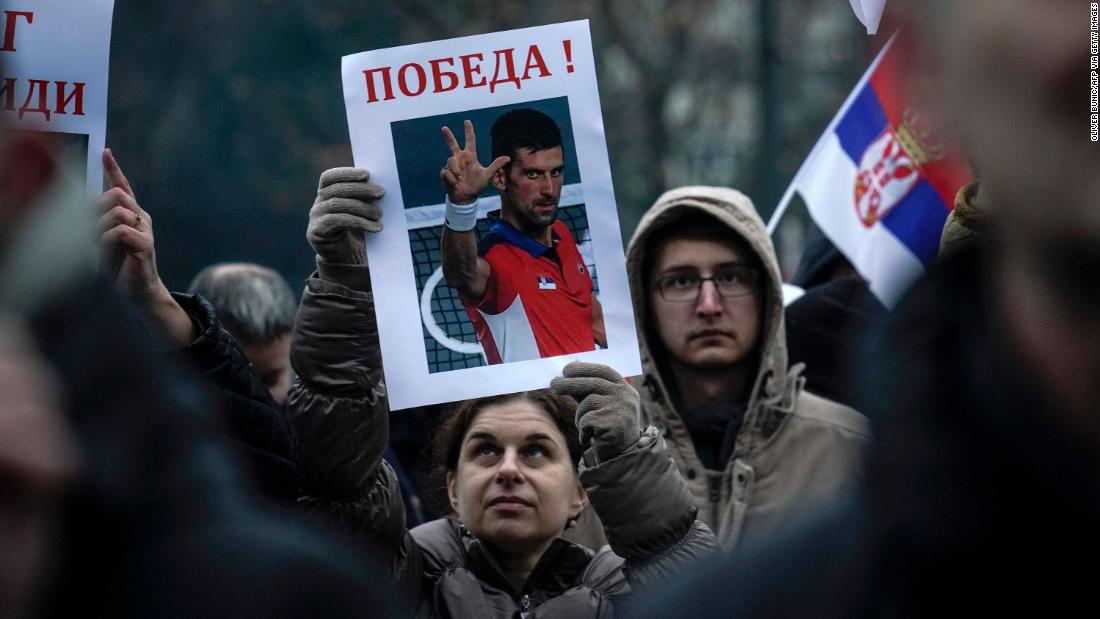Novak Djokovic is famed for refusing the vaccine — but in Serbia, he’s an idol
Lately, that’s hardly hyperbole in the small Balkan nation of seven million people, where Djokovic is revered unlike almost anyone, save for Jesus Christ himself — though Srdjan hasn’t been shy to compare him to the son of God.
For many of his fans, any attack on “Nole,” as he is known, is an attack on the whole country.
Australia’s decision to detain and then deport the sportsman on the eve of the Australian Open — robbing him of the chance to defend his title — was greeted with fury here.
“They trample Novak, and so they trample Serbia and the Serbian people,” Srdjan Djokovic said while his son was in immigration detention, accusing Australian authorities of holding his son captive.
“They wanted to … bring him to his knees, and not only him, but also our country, our beautiful Serbia. We are Serbs: proud European, civilized people. We never attacked anyone, we just defended ourselves.”
Serbian President Aleksandar Vucic called the world No. 1’s treatment “a literal witch hunt,” while Prime Minister Ana Brnabic, and the country’s Olympic Committee, branded Australia’s actions “scandalous.”
An idol at home
Djokovic arrived back in Belgrade on Monday after losing a court challenge against the Australian government’s decision to cancel his visa on public health and order grounds. At issue? His stance on Covid-19 vaccinations, which authorities feared could incite the country’s anti-vaxxers.
The tennis star, who has twice tested positive for Covid-19, has spoken out against compulsory inoculations, telling reporters at last April’s Serbia Open: “I’ve always believed in freedom of choice,” according to Reuters.
At the time, he refused to say whether or not he planned to get vaccinated: “It’s an intimate decision … I don’t want to be labeled as someone who is against or who is for vaccines. I’m not going to answer the question.”
But many in Serbia — including PM Brnabic — bristle at any attempt to paint Djokovic as an anti-vaxxer.
“I do not see Novak as an anti-vaxxer,” she told CNN this week. “He supports the vaccination of those people who want to be vaccinated.
“He’s an idol and a lot of people look up to him,” one of Djokovic’s closest friends, former tennis pro Viktor Troicki, told CNN. “But it’s his personal stance … Whatever he decides is best for him, it’s his decision.”
A question of choice
PM Brnabic finds herself in the odd position of promoting vaccines in her country — where less than 60% of the adult population has been inoculated — while also defending Djokovic’s decision not to get vaccinated.
She says she doesn’t know why he’s hesitant, but insists he is under no obligation to explain. “It’s his own personal decision. You will have to ask Novak. I know that vaccination is the only way out of this pandemic.”
In Serbia, the whole episode has been widely dismissed as a calculated political move, despite Brnabic telling CNN she got “reassurances that politics would not be involved” from Australian officials. The Australian Foreign Ministry did not respond when asked about her charge.
Here, Djokovic’s stance on the vaccine isn’t remarkable at all — it is shared by many people CNN met in Belgrade over the past week.
“He was judged … because he thought something, he didn’t even say it,” said one young fan waiting to welcome Djokovic at the airport.
And even those who believe strongly in vaccination defend the right of others to refuse the jab.
“Do we not live in [a] democracy?” said Brnabic. “In the toughest of times, you need to defend personal choices, not necessarily agreeing with those choices.”
“I would never want to be the prime minister of a country whose police are brutally beating people up in the streets because they’re protesting against vaccination,” she added.
Representing Serbia on the world stage
Djokovic’s image may have taken a hit among fans abroad following the visa battle, but at home, the episode has sparked a surge in Serbian patriotism.
While Djokovic was being held in immigration detention at the Park Hotel in Melbourne, dozens of fans — many of them from Serbian cultural groups — demonstrated in the street outside, waving flags, singing and holding up posters.
At home, a protest in support of the world No. 1 was held outside the National Assembly, and the night before he returned to Serbia, a building in Belgrade was illuminated with the words: “Nole, you are the pride of Serbia.”
Former Serbian diplomat Vladeta Jankovic, who has met Djokovic on several occasions, calls him “the best thing to happen to Serbia this century.” But speaking about the surge in patriotic support for the star, says: “Let’s not confuse it with nationalism, please.”
Jankovic says Serbia’s image abroad was badly damaged — especially in the eyes of the West — following the war in the 1990s. “It was almost embarrassing to be a Serb, when in England or the USA in those days,” he told CNN.
Then along came Djokovic, a humble, church-going, multilingual tennis prodigy who helped repair and raise the country’s profile.
“Novak Djokovic is a global phenomenon, and if he decided to take a vaccine, it would probably increase numbers all over the world,” said Jankovic.
And he says Djokovic’s popularity at home is as solid as ever, even after his unceremonious exit from Melbourne.
“I don’t think it has changed anything. His right of choice is beyond doubt. I think what was wrong is that he came to Australia and trusted this invitation … and it all ended very unfortunately for him.”
The whole ordeal is far from being just about a tennis player, as President Vucic made clear to Australia, but “an entire nation that is free and proud,” he said. “He will remain the best tennis player of all time and will always be in our hearts.”
For all the latest world News Click Here

